DapuStor J5060 61.44TB U.2 Enterprise SSD Review - Efficient Read-Centric Mass Storage
*This review is written by Jon Coulter, a senior hardware editor from TweakTown Review, a prestigious testing and review agency focusing on storage industry. Read more.
The world has a new high-capacity contender in the enterprise space. DapuStor's new 61.44TB J5060 delivers massively for read-intensive applications.

| TweakTown’s Rating: 92% | ||
| The Bottom Line | ||
| You can't do any better than DapuStor's J5060 61.44TB when it comes to TCO for read-intensive applications. | ||
| Pros | ||
| ✔️Up to 1.7 million RR IOPS | ||
| ✔️Read performance | ||
| ✔️Massive capacity | ||
| ✔️Power efficiency | ||
| Cons | ||
✘ Write performance |
01 Introduction and Drive Details
The trend toward ultra-high capacity read-centric SSDs in the datacenter continues to gather steam. This trend is fueled by the promise of lower TCO enabled by density within the same footprint. If your server can hold double or quadruple the data within the same footprint, with a similar power draw, then TCO (Total Cost of Ownership) massively improves. As always, TCO is the primary consideration for any substantially sized enterprise storage application. In this sense, capacity inherently equates to efficiency.
DapuStor's J5060 61.44TB SSD is the second SSD of its kind we've had in the lab for testing. The first was, of course, Solidigm's 61.44TB P5336 we reviewed back in August of 2023. At the time, there was nothing else that could compete with it on the capacity front or the efficiency front. Well, at long last, we now have a new contender and it's available right now.
DapuStor touts its ultra-high capacity J5060 SSD as being engineered for read-intensive applications, able to meet growing storage demands across diverse sectors, including AI, cloud storage, IT, internet services, finance, telecom operators, big data, and intelligent manufacturing. The company further states that its J5060 61.44TB U.2 SSD is a cost-effective option that's reliable and scalable, making it an ideal choice for enterprises seeking efficient data management within budget constraints.
As we see it, the J5060 61.44TB SSD is a welcome addition to the ultra-high-capacity solid state storage swim lane for one specific reason - superior read performance. Our testing shows the drive capable of up to 1.7 million 4K random IOPS which is a full 70 percent better than Intel's P5336. Additionally, and nearly as impressive is the drive's over 7,500 MB/s sequential read throughput.
Okay, now let's get into the review and find out firsthand what DapuStor's ultra-high-capacity offering can do for you by the numbers.
02 Specs/Comparison Products
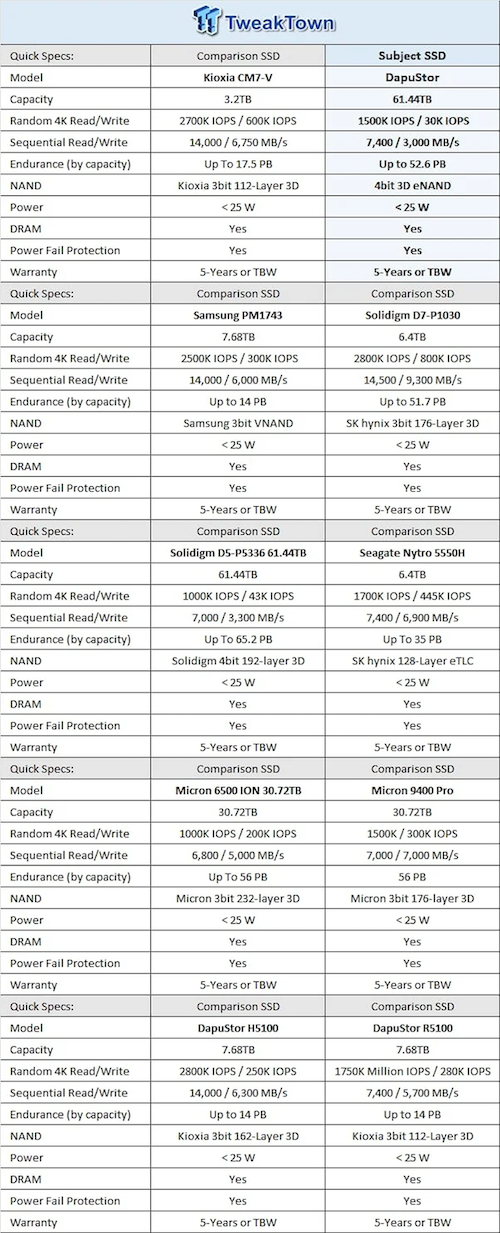
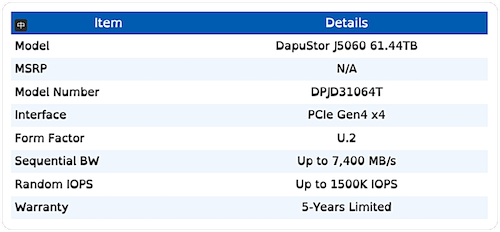
03 DapuStor J5060 61.44TB U.2 SSD PCIe Gen4 SSD
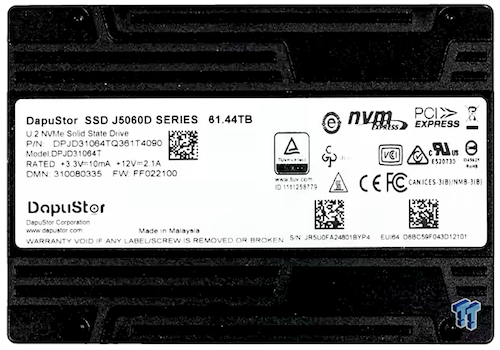
DapuStor's J5000 series is available in 2.5-inch U.2 factor. Capacities range from 15.36TB to 61.44TB. These SSDs are compatible with major operating systems such as RHEL, SLES, CentOS, Ubuntu, Windows Server, and VMware ESXi.
04 Test System Specs & Enterprise Testing Methodology
1) Enterprise SSD Test System
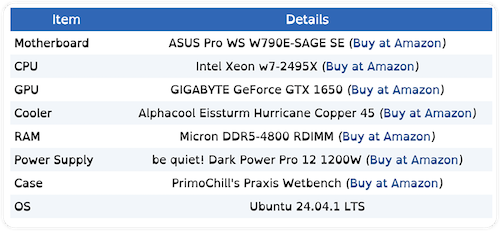
Prior to the AI revolution, datacenter SSDs' normal operating range would typically never exceed QD32. With AI data pipeline storage being directed by GPU, high queue depth performance has become paramount. Queue depths in the thousands are now commonplace, which is why we've changed our test platform, methodology, and operating system. Our charted upper queue depth range has been revised from QD256 to QD4096 for random data and up to QD1024 for sequential testing.
2) Testing Methodology
TweakTown strictly adheres to industry-accepted Enterprise Solid State Storage testing procedures. Each test we perform repeats the same sequence of the following steps:
1. Secure Erase SSD
2. Write the entire capacity of SSD 2x (2 loops) with 128KB sequential write data, seamlessly transition to the next step (sequential testing skips step 3)
3. Precondition SSD by filling the drive twice with 4K or 8K random writes
4. Run test-specific workload with a 30-second ramp up for 5 minutes at each measured Queue Depth, and record average result
05 Benchmarks - Sequential
1) 128K Sequential Write/Read
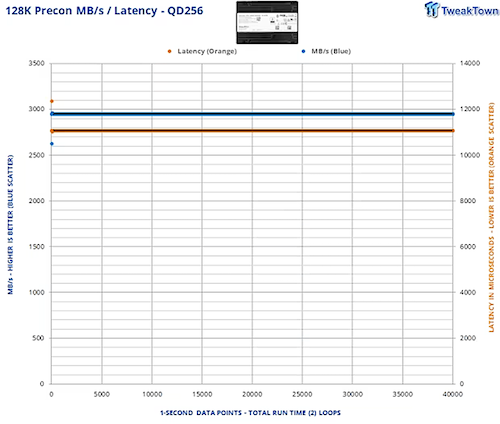
We precondition the drive using 100 percent sequential 128K writes at QD256 using 1-thread for 2-drive fills, receiving performance data every second. We plot this data to observe the test subject's descent into steady-state and to verify steady-state is in effect as we seamlessly transition into testing at queue depth. A steady-state is achieved after 1-drive fill. Average steady-state 128K sequential write performance at QD256 is approximately 2,950 MB/s.
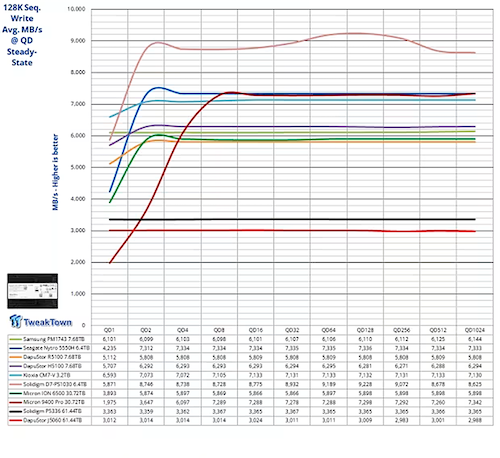
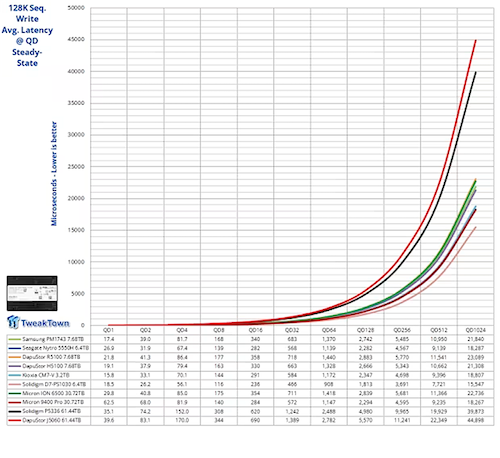
DapuStor specs its J5060 61.44TB U.2 SSD as capable of delivering up to 3,000 MB/s 128K sequential write throughput and that's exactly what we are getting here. Overall, the drive is roughly 10 percent slower than its immediate competitor, Solidigm's P5336 61.44TB U.2 SSD.
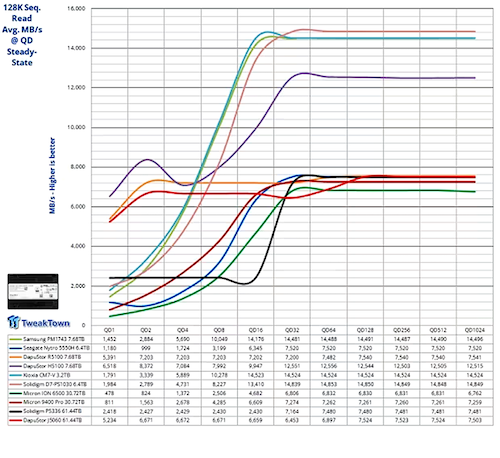
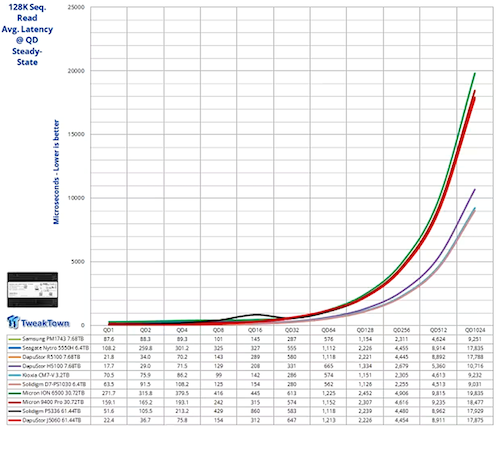
Outstanding performance curve here. It's the second best we've encountered to date from any PCIe Gen4 SSD. The only PCIe Gen4 SSD delivering a better performance curve here is DapuStor's own TLC arrayed R5100. Impressive.
06 Benchmarks - Random
1) 4K Random Write/Read
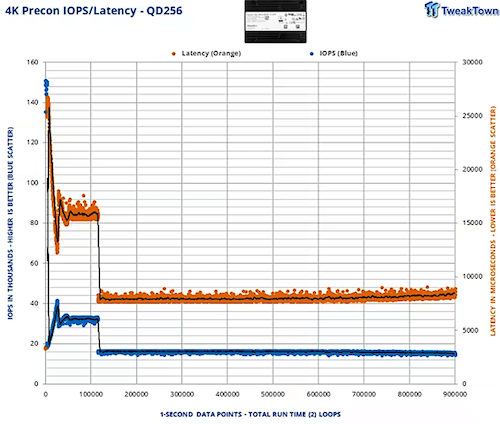
We precondition the drive using 100 percent random 4K writes at QD256 for 2-drive fills, receiving performance data every second. We plot this data to observe the test subject's descent into steady-state and to verify steady-state is in effect as we seamlessly transition into testing at queue depth. A steady-state is achieved after 1-drive fill. Average steady-state 4K random write performance at QD256 is approximately 17K IOPS.
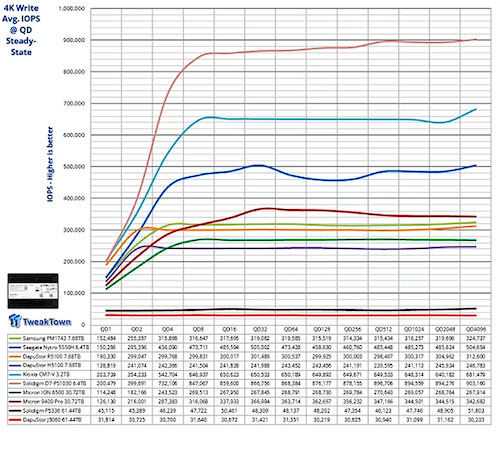
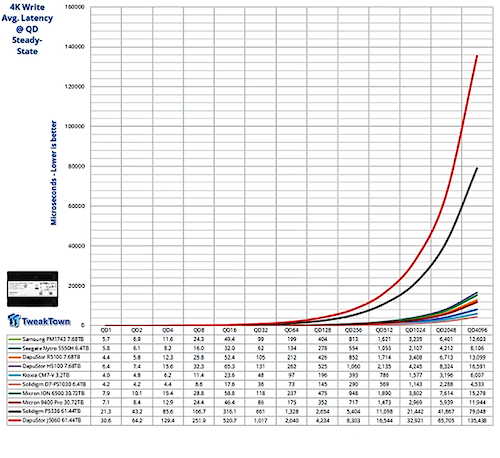
The drive is rated at up to 30K for 4K random write IOPS, and we are getting 31K, so again, exactly as advertised. As we observed previously, when writing data, Solidigm's P5336 61.44TB SSD has the edge.
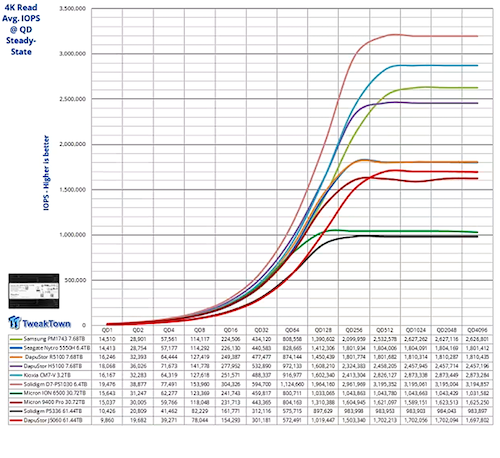
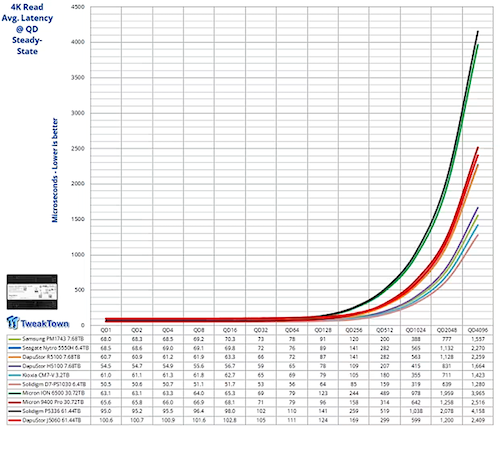
At the top end, we can achieve over 1.7 million 4K random read IOPS. This is an impressive 200K higher than factory spec, so that's great. Here, we can see that DapuStor's 61.44TB offering has an up to 70 percent advantage over Solidigm's 61.44TB SSD when reading 4K random data at queue depths of 128 or higher.
2) 4K 7030
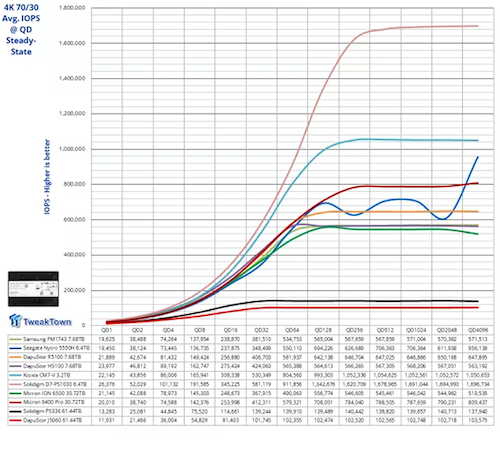
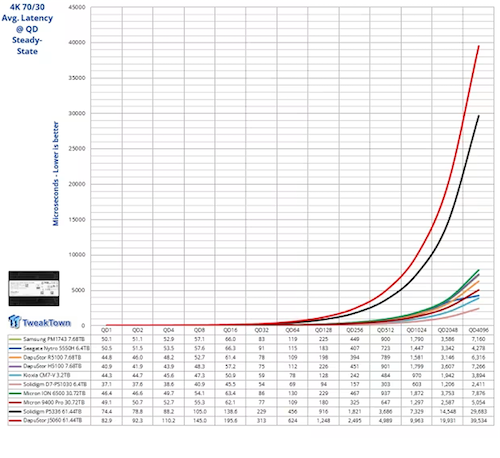
As soon as we introduce writes into the mix, Solidigm's P5336 regains the upper hand on its rival.
3) 4K 5050
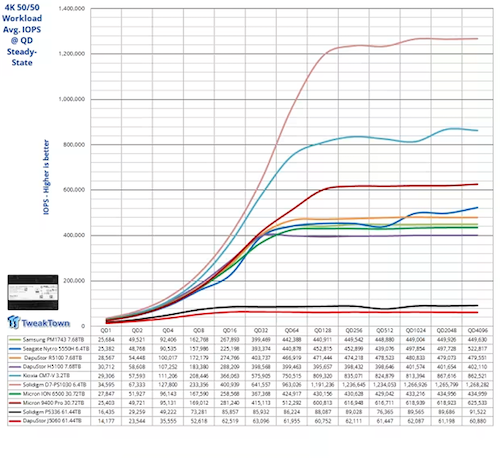
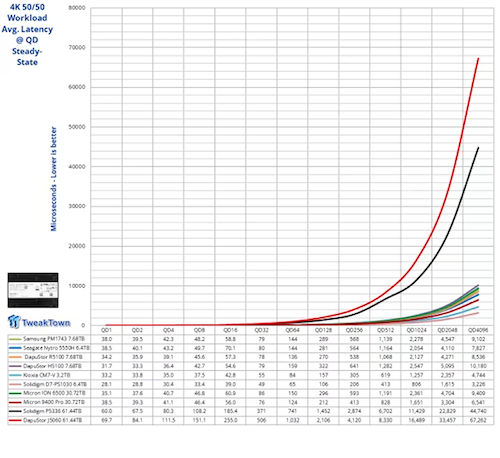
More of the same here. Our read-centric test subject is at a clear disadvantage when writing data.
4) 8K Random Write/Read
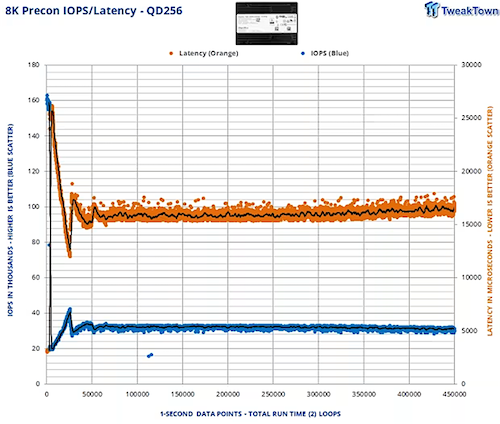
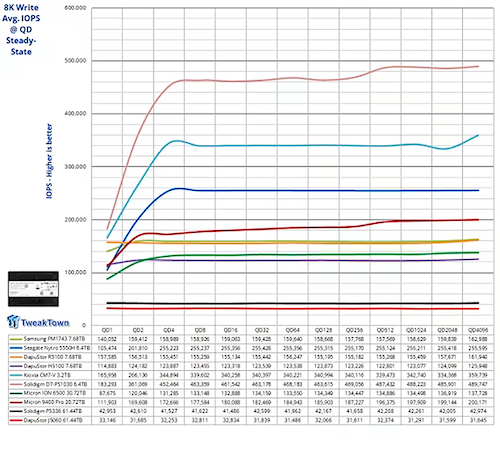
We precondition the drive using 100 percent random 8K writes at QD256 for 2-drive fills, receiving performance data every second. We plot this data to observe the test subject's descent into steady-state and to verify steady-state is in effect as we seamlessly transition into testing at queue depth. A steady-state is achieved after 1-drive fill. Average steady-state 8K random write performance at QD256 is approximately 32K IOPS.
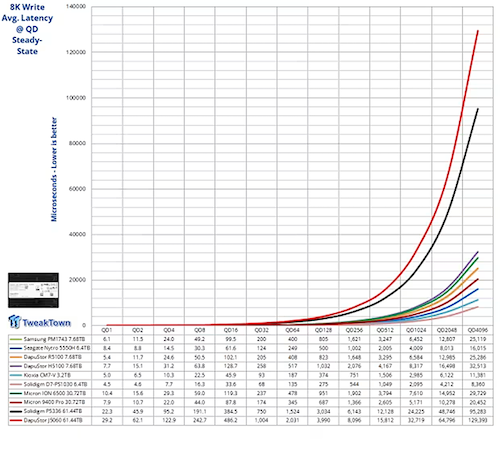

We expect 8K random to track pretty much the same as 4K random here, just at a lower IOPS rate because it's moving twice the amount of data. Surprisingly, our test subject can deliver more IOPS with a pure 8K write workload than it can at 4K. This is the only SSD we've ever seen to do this. Interesting.
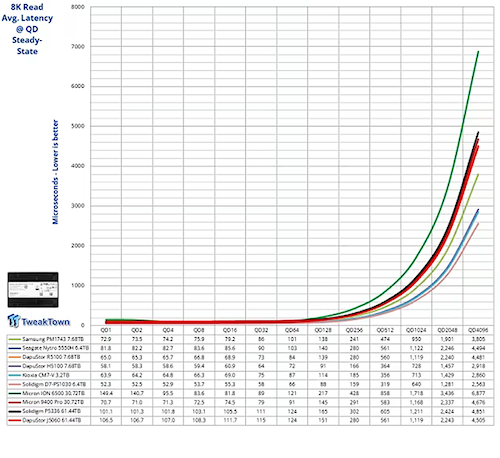
At QD128 or higher, our test subject manages to distance itself from its primary rival, Solidigm's P5336. Additionally, when serving data to the host at high queue depths, the J5060 can deliver as good as it gets for any PCIe Gen4 SSD. Impressive.
5) 8K 7030
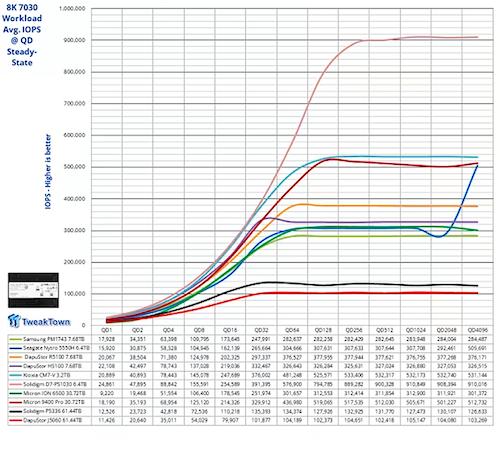
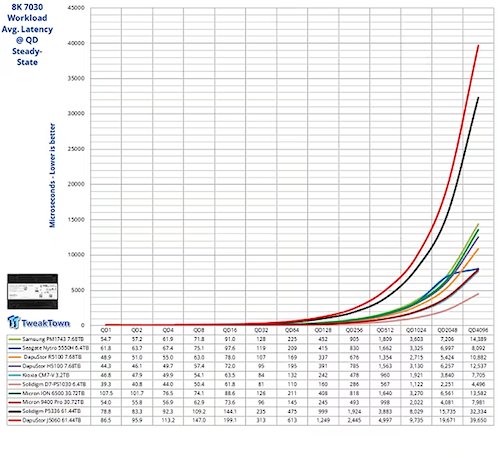
8K 7030 is representative of a common database workload. Here again, we find our test subject falling behind its Solidigm competitor when writes are introduced into the mix.
6) 8K 5050
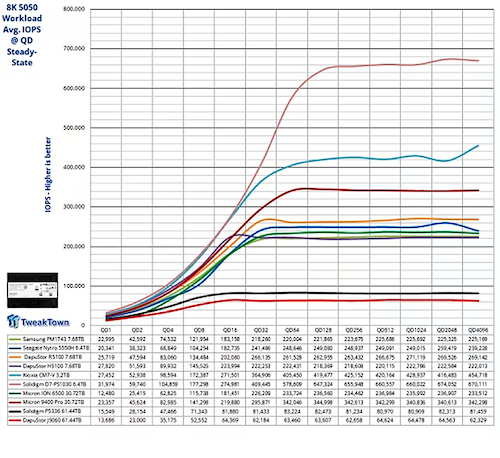
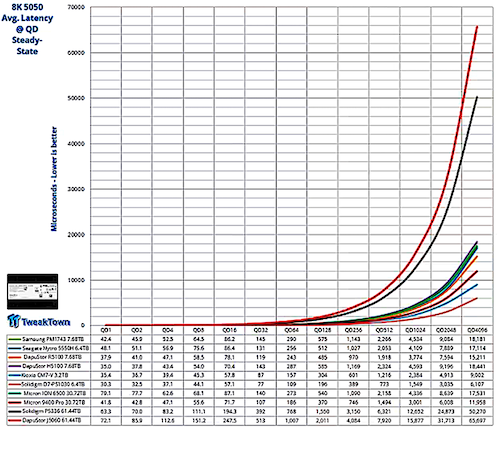
Maybe a bit better than we saw at 8K 7030 but still bottom of the barrel mixed workload performance.
07 Final Thoughts
DapuStor's J5060 61.44TB is, without a doubt, the most read-centric SSD we've ever encountered. This is not surprising in the least, considering the drive is meant to write infrequently and read frequently. We are of the opinion that for heavily read-centric applications, it is likely the most efficient SSD of its capacity point currently in circulation.
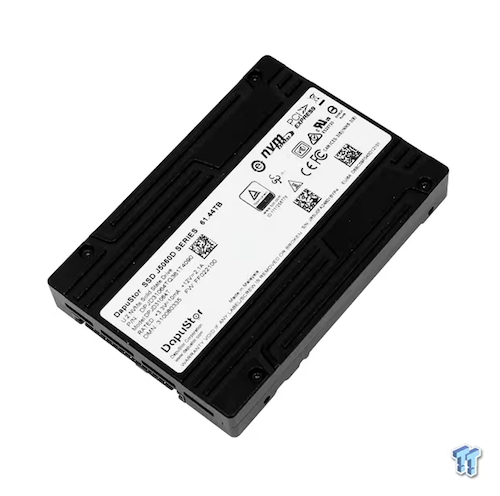
Based on its capacity, read prowess, and power efficiency, we award DapuStor's J5060 61.44TB U.2 SSD our Best Value Award.
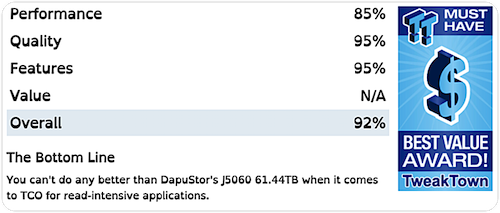
About DapuStor
DapuStor Corporation, founded in April 2016, specializes in enterprise solid-state drives (SSD), SoC, and edge computing products. With a world-class R&D team of over 400 members, the company has comprehensive capabilities from chip design to mass production. DapuStor’s products are widely used in servers, telecom operators, and data centers, empowering businesses worldwide to manage their data more efficiently.
For more information, please contact:
Email: mkt@dapustor.com
Website: en.dapustor.com
